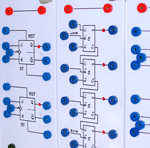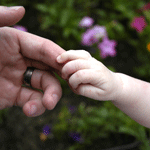 Are you a control freak? Perhaps even the teeniest little bit? Most of us don’t like to admit it… I used to be an expert in “Control Theory”. Nowadays I’m studying much more about letting go of control. Would you like to find out why going with the flow can literally set you free?
Are you a control freak? Perhaps even the teeniest little bit? Most of us don’t like to admit it… I used to be an expert in “Control Theory”. Nowadays I’m studying much more about letting go of control. Would you like to find out why going with the flow can literally set you free?
Back in my Uni days, I studied something called “Control Theory”. (My degree was Mechanical Engineering, but this one sounded like something straight out of a psychology text book.) And, though I never quite understood why, I was very good at it.
Anyway, “Control Theory” was about how two (or more) related systems behave together – and how to set it up so that one controls the other. And how to predict how this interaction will behave, under certain circumstances. Sound familiar?
 I remember very little about the subject now (apologies to my former lecturer), but I do remember it was about taking a “real world” scenario, turning it into a representation of that scenario, using mathematics, then being able to predict what the “output” would be, given various “inputs”.
I remember very little about the subject now (apologies to my former lecturer), but I do remember it was about taking a “real world” scenario, turning it into a representation of that scenario, using mathematics, then being able to predict what the “output” would be, given various “inputs”.
There were very specific rules and expectations for how the systems would behave and I remember the aim was to simplify your model, as far as you could, removing any unpredictability or “noise”.
The other thing I remember about these mathematical “maps of the world” was that there was always this elusive thing called “gain”. You put something in, you turned up the gain, you got something else – even better – out.
Several decades on (ahem, not spilling those beans, thank you!), I have found that “Control Theory” bears a striking resemblence to “real life”.
In order to try to make sense of the world, we simplify our model of things – making assumptions about how things really are.
Then, because we tend to feel more comfortable when we can predict the outcome, we go for our own, personal version of control theory.
Most of us have figured out that by doing a particular thing a particular way, we get the outcome we wanted.
We like to feel we are in control.
In fact, much of the stress-related illness that is so rampant these days has its roots in us feeling out of control.
Yet needing to control everything can be completely exhausting, which also makes you ill.
Feeling out of control causes emotional, mental and even physiological symptoms. It’s as though we feel we have to be in control, otherwise something terrible will happen. We develop all sorts of coping strategies, to help us stay in control, no matter what happens. And if we lose control, we can end up freaking out.
The funny thing is that very little of what we try to control is actually within our control.
Usually we’re trying to control:

- Our kids
- Our partner
- Our home / work environment
- Friends / family / co-workers
- The weather!
But none of these things are actually in our power to control. Sure, we can influence them, but actually controlling how others behave is impossible. So, instead, we resort to highly effective tools like guilt, coersion, persuasion and even near-bulllying-tactics, to get the outcome we want.
Why do we do this? What’s the “gain” for us?
We get the predictable outcome that we wanted. We feel safe. Life “makes sense”.
The weird thing is that, whilst spending all this exhausting time and effort, trying to control things outside of ourselves, we put very little effort into controlling ourselves.
- We let our thoughts run rampant.
- We feel victim to our emotions.
- Life “happens to us”.
- Inner peace is – apparently – only for the deluded.
- It’s “not our fault” – “we can’t help it”.
We abdicate the entire responsibility for our happiness onto how those around us behave.
If we stop and think about that for a minute, that’s really scary.
- You made me angry ~ How did they force you to feel angry?
- If you do that, I’ll feel happy ~ So you’re choosing not to feel happy, if they don’t do that?
- If it’s sunny on Sunday, we’ll have a lovely afternoon ~ Are you choosing to have a bad afternoon, if it’s not sunny?
Is it really fair to make other people or external circumstances responsible for our happiness?
Isn’t that giving away our personal power?
It’s no wonder we want to try to stay in control.
But what can we do instead?

Does it really matter if someone does something differently to us, if they get the same outcome? Yes, it might take longer or there might be mistakes to learn from, but does it really matter?
Imagine what it would feel like, to be able to let go of feeling responsible for everything and everyone?
What would happen if we reclaimed our personal power?
Imagine what it would feel like, to be able to feel ok, even if someone else is behaving badly?
Over the coming weeks, I’m going to be writing a series of articles to help you move from needing to be in control, towards getting back into flow with life, feeling happier, less stressed and taking steps towards letting miracles into your life.
If that’s a journey that appeals to you, make sure you don’t miss any of the articles by bookmarking this link:
Next time I’ll be writing about the hidden price of trying to stay in control and why you could be throwing away your dreams. See you then!
